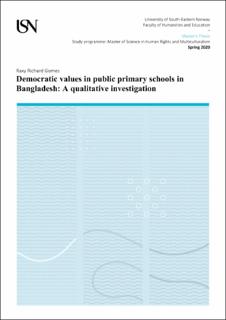Democratic values in public primary schools in Bangladesh: A qualitative investigation
Master thesis
Permanent lenke
https://hdl.handle.net/11250/2673644Utgivelsesdato
2020Metadata
Vis full innførselSamlinger
Sammendrag
The People’s Republic of Bangladesh is a democratic country according to the national constitution. The country has a strong history of student participation in active democracy based activities since before its liberation in 1971. Student participation for a country’s democratic freedom is crucial for this economically developing country. Yet, establishing democratic, moral civic education and citizenship values were undermined for long time in the primary school education system in Bangladesh. The National Education Policy 2010 pointed out the importance of democratic, moral civic and citizenship perspectives in securing future democratic citizens. This thesis is an attempt to identify understanding, existence and practice of democracy related values at seven public primary schools in Bangladesh. The study has a qualitative approach to investigate the topic and used purposive sampling of teachers. The analytical framework is developed by discussing Gert Biesta, John Dewey and Patricia White’s viewpoints on democratic values. Democratic values of participation, freedom and courage were the outcome of the framework discussion, utilized to assist in the inquiry of the main research questions of this thesis. As data collection methods, document analysis and semi-structured interviews were used to investigate the two research questions of this study. The national constitution of Bangladesh, national education policy (NEP) 2010, education guidelines by the Directorate of Primary Education (DPE) and curriculum by National Curriculum and Textbook Board (NCTB) were used as primary documents to investigate the first research question. Individual and group interviews were conducted at seven schools to gain insight from participating teachers on democratic understanding and practice. With the help of the analytical framework’s outcome, the findings of the two research questions indicate that participants have a very minimal understanding of democratic, moral civic and citizenship ideals. In terms of practicing and teaching values related to democracy to young students, the participants require more training and time to adapt the new pedagogical changes that were introduced by NEP 2010. In this study, participant teachers indicated their willingness to teach moral values to students and acknowledged their shortcomings due to cultural practice, politics and faulty bureaucracy.
